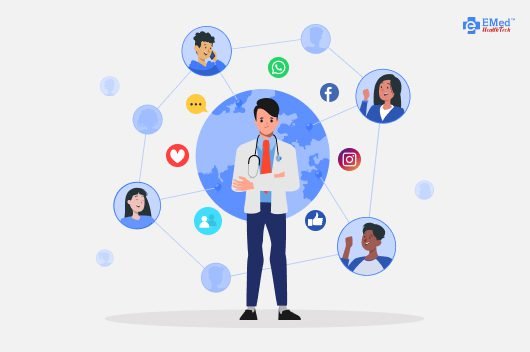Access to online social connections has entirely changed the patient journey, and your brand strategy should evolve with it to effectively identify where your patients are.
A recent study surveyed about 2,371 patients across a diverse representation of health situations to better understand social health – the digital simply means by which health consumers engage about their health – impacts patient experiences.
About 95% of patients surveyed utilize online social resources for health reasons. Wonder, how can these resources be leveraged as mutually advantageous for both patients and pharma?
What is social health?
When we think of social health, we often think of social media; however, healthcare is more prominent than social media. Social health in the community, connection, and socialization of patients across the entire social sphere, including groups, messaging, communities, audio, and video.
In today’s hyper-connected digital world, patients seamlessly change from patient communities to social media platforms to peer-to-peer communications to engage healthcare professionals in digital content and conversation. All healthcare SEO is social – and that change is permanent.
Patient education.
Patients today depend on social interactions to identify, connect, validate, and share. Social media has easily improved patients’ access to health care data and other educational resources. In the USA, 8 out of 10 Internet users seek health information online, and nearly 74% of these people use social media.
Healthcare patients can participate in online communities via social media and research, receive financial or moral support, set goals, and monitor personal progress.
Patients trust other patients.
Patients often connect with other patients who have experienced a similar disease to understand its symptoms, treatment options, and how they overcome it and live a healthy life now.
When patients talk to these people, they can feel relaxed and get the information they require to act accordingly.
It’s more of a social journey.
In the early stages of checkups, patients often start as consumers of information and, after some time, evolve to become sharers. The techniques for consumption and sharing also evolve and are not mirror images of one another.
Recent studies show this with nearly 93% of patient influencers – compared to only 64% of non-influencers – sharing some essential health data they get with others.
Patient communities.
Patients are additionally utilizing social media to connect with other patients who got affected by similar kinds of diseases. Some social networking sites provide a venue for patients to access information, suggestions, and support from other patients who have experienced the same disease or condition. Moreover, Facebook groups often focus on specific medical conditions. These groups actively engage in end-to-end support and fund-raising efforts for affiliated groups and individuals.
A study showed 58% of analyzed comments within the Facebook pages of its communities show expressions of social support for others, proven through data-sharing, expressions of empathy, and encouragement to others. In fact, one participant commented, there are many days when these posts remind him that he is not the only one dealing with these same issues.
Patient influencers.
Given the superior level of trust that patients place in patient influencers, it’s no surprise that these patient leaders additionally drive patient behavior.
Moreover, patient respondents shared that when someone they considered to be significant shares information about a particular medication, 9 in 10 will ask their doctor about that information. Beyond that, 9 in 10 will further continue sharing it with others they believe to be interested.
Patient influencers within and outside patient communities inspire their communities to take meaningful action.
Conclusion
Social media is considered a new revolution in healthcare. It has completely transformed the way patients seek and share health information. Social media allows for any time anywhere access to and dissemination of information around the globe.
Just imagine a future in which patients tap their phones and understand where they are in their social healthcare journey. That vision of connecting patients to care and sharing data when and where they choose—is what digital healthcare is all about. When social healthcare systems focus on decreasing costs and increasing patient satisfaction, everyone will win.
However, this healthcare digital transformation doesn’t simply happen at night. Even though healthcare systems are forecasting their revenues rebound from COVID-19 restrictions, emergency department volumes remain around 75% of their pre-pandemic cap. It turns out that not all patients want to return to the complexities and inconveniences of healthcare digital marketing.
For better digital healthcare solutions, get in touch with experts at EMed HealthTech today!










